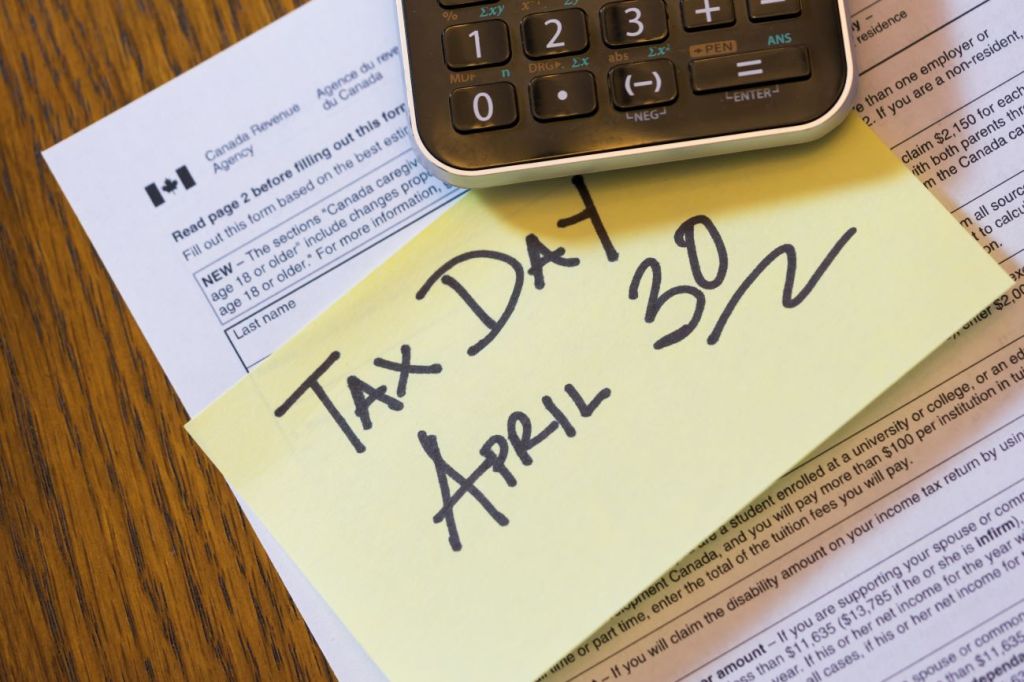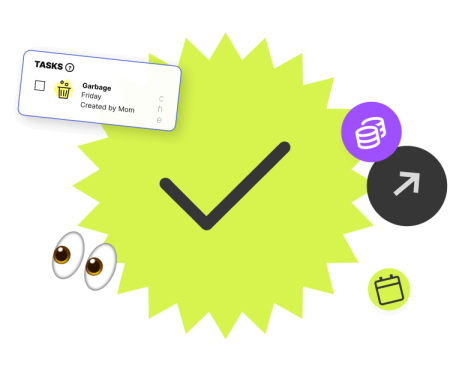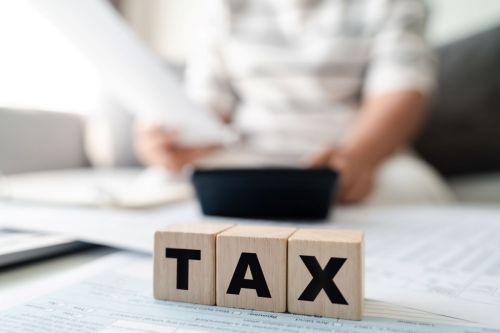It’s an exciting time when kids and teens start making their own money. Less exciting is the reality of income taxes and filing an annual return—at least, if they earned $15,00 or more in 2023.
However, learning all about income taxes and how they work in Canada is an opportunity for parents to guide kids into becoming financially literate adults. And since there are updates or amendments to income tax returns almost every year, there’s always more information to learn—even for parents.
Here, we break down what income tax is, how it works, when income tax is due in Canada, what income is taxable, and how to calculate income tax.
Key messages
- Canadian individuals (and businesses) pay a portion of what they earn to the government. This payment is known as income tax; it helps pay for public services and contributes to financial relief for vulnerable or modest-income Canadians.
- The Canada Revenue Agency (CRA) is responsible for making sure all tax laws are followed in Canada. Taxes are filed directly with the CRA.
- Employed Canadians must pay and file taxes by April 30 (unless this date falls on a weekend). Self-employed Canadians must pay their taxes by April 30 but can file anytime before June 15.
- Canada has a graduated tax system, and the amount of money you make each year determines how much you’ll pay.
- Most income is taxable, but not all. Lottery winnings, educational scholarships, and government-paid benefits are just some streams of income that are not taxed.
What does income tax mean in simple terms?
In Canada, businesses and individuals have to pay a set portion of what they earn to both federal and provincial governments; this is known as income tax.
We pay these taxes to gain all the perks of living in a developed, wealthy nation. That tax money helps keep the government running smoothly and delivers much needed services, such as libraries, education, hospitals, roads, and the military. Some even goes toward our public broadcaster, the CBC. The government also uses taxes to help vulnerable and modest-income Canadians, directly paying out child benefits, employment insurance, old age security, and social assistance.
If you think one person’s income taxes don’t have much impact on how the government operates, think again: Personal income taxes make up nearly 50 per cent of the Canadian government’s total revenue.
The income tax we pay is meant to help one another and make life in Canada as fulfilling as possible.
Read more about the most important income tax definitions.
How does income tax work in Canada?
The CRA, short for the Canada Revenue Agency, is the revenue service of the federal government, and it ensures that tax laws are being followed. (Yes, your income taxes also fund the CRA.)
It also handles everyone’s tax returns. So, each year, when everyone goes about filing taxes in Canada, the CRA does its best to check for accuracy and redistribute funds to Canadians who may need it most via benefits and credits.
Tax brackets in Canada can help determine who should pay more taxes and who is eligible for support. Some support systems include the Canada Child Benefit for families with children under the age of 18, the GST/HST credit, which supports low-income households, and the Guaranteed Income Supplement for qualifying Canadians 65 and older.
When filing taxes in Canada, be careful to note all your streams of income (e.g., side hustles, cash tips, rental income) as well as eligibility for any tax deductions or credits. The CRA trusts you to do your due diligence, but they may review or audit your taxes—“audit” means a close inspection or examination of your income, expenses, and other records that relate to your income taxes. There can be serious consequences if you’re caught providing false information, from interest fees to fines and even jail time.

When is income tax due in Canada?
The deadline for filing your taxes depends on whether you’re employed or self-employed.
Most Canadians fall under the “employed” category. Their deadline for both filing taxes and paying any taxes owed is April 30, or the nearest business day.
Self-employed individuals, however, can file their return a little later, by June 15. The catch is that any taxes owing still must be paid by the same deadline as everyone else. Why the extra time to file? Self-employed people are responsible for figuring out their own taxes, while employed individuals have the bulk of this work done for them by their employers throughout the year. Come tax time, employees have an advantage. Because it takes extra work for self-employed people to gather all the necessary information to file a return, they get a small break from the CRA.
For anyone who has to file and pay taxes, however, you don’t want to procrastinate. The CRA could penalize you with a hefty late fee: five per cent of your balance owing, plus an extra one per cent for every month you’re late. So it’s best to start your taxes early.
Depending on the taxes deducted from your paycheque throughout the year, you’ll either receive or owe money at tax time. If you’re self-employed, plan on owing taxes. Setting aside some money from each invoice payment—between 25 and 30 per cent of income—will help cover most of the money owed at tax time.
Income tax rates in Canada
In Canada, the amount of money you make in a given tax year determines how much you’ll pay in taxes. This is called a graduated, or progressive, tax system. The idea is that people who earn more pay higher taxes; people who earn less pay less.
To help decide who pays what, the CRA applies income brackets to determine an applicable tax rate to everyone. Earners in the lowest tax bracket pay a percentage of their earnings. When you enter the next tax bracket up, you’ll pay that new tax rate on money earned inside that bracket. This is called a marginal tax rate.
For example, for 2024, everyone pays 15 per cent on the first $55,867 of taxable income. But let’s say you get a raise or a new job that pays $58,000. Assuming this is your new taxable income, you’d pay 15 per cent on that first $55,867 and 20.5 per cent on that extra $2,133. The higher the tax bracket, the higher the tax rate.
Here’s a breakdown:
- 15 per cent on the first $55,867 of taxable income, plus
- 20.5 per cent on the next portion of taxable income from $55,867 to $111,733, plus
- 26 per cent on the next portion of taxable income from $111,733 to $173,205, plus
- 29 per cent on the next portion of taxable income from $173,205 to $246,752, plus
- 33 per cent of taxable income over $246,752.
If this math is overwhelming, don’t worry. Most online income tax services will do these tax-bracket calculations for you. A certified tax professional can also crunch these numbers if you hire them to file your income taxes on your behalf.
What income is taxable in Canada?
Most income is taxable—but not all. When filing taxes for the first time, it’s key to know which income is taxable and which income isn’t so you don’t overpay the government by accident. Income we must pay taxes on includes:
- Employment income: Money earned from any job.
- Self-employment income: Money earned through providing a service or selling goods as a sole proprietor or business partner.
- Interest: This is income earned on funds in a bank account, GIC, or bonds. If interest income is over $50 for the tax year, the payer, such as a bank, will usually issue you a T5 slip for your tax return.
- Investments: Income earned from selling stocks, bonds, or investment property.
- Pension income: Income you get at retirement, such as payments from the Canadian Pension Plan or Québec Pension Plan.
- RRSP withdrawals: Income received when money is withdrawn from a registered retirement savings plan (RRSP), whether at retirement or earlier.
Read more: Guide to family tax deductions in Canada.

What income is not taxable in Canada?
Luckily, the government doesn’t tax every dollar that lands in your pocket. Some income is tax-exempt, meaning you don’t have to declare it on your income tax return; this includes:
- Lottery and gaming: Whether you win big with lucky numbers or cash in at the casino, winners take all in Canada. (But any interest earned on these winnings, for example, would be taxable.)
- Most inheritances and gifts: No need to declare birthday cash and graduation gifts. If someone passes away and leaves you some of their estate, this is also exempt from income tax. (If the person who passed away owed any taxes, however, payment might have to come out of this inheritance.)
- Canada child benefit and/or GST/HST credit: Designed to help offset living costs for Canadians, the government doesn’t ask for a percentage of these payments back.
- Most amounts from life insurance policy payouts: While most of this money goes to the living beneficiary, there may be circumstances where some of it goes toward taxes. Check with a certified accountant.
- Educational scholarships: You can put all of that money toward a bright future!
- TFSA withdrawals: This is why they’re called “tax-free savings accounts.” But stay within your TFSA contribution room—any excess will be taxed.
- Strike pay from a union: If you’re out picketing with other union members, strike pay is yours to keep.
- Victim compensation: Provincial or territorial payments to victims of crime or motor vehicle accidents are not taxable.

How is income tax calculated in Canada?
Calculating income tax isn’t all that complicated once you’re familiar with the basic steps and terminology. From there, it gets easier to figure out how to get the most from your income tax return.
In a nutshell, here’s how to calculate your income tax:
- Calculate your gross income, which is the total of all your earnings.
- Subtract the eligible amount of any applicable deductions, such as donations made to registered charities or CRA-approved medical costs.
- Calculate your taxable income: gross income minus deductions equals your taxable income.
- Now, multiply this taxable income against its related marginal tax rate.
- The resulting amount is how much you owe in taxes.
This simplistic summary of calculating income taxes doesn’t factor in all the different ways you can reduce your taxable income, nor does it list the many deductions available. There are plenty of online tools available to catch every detail and guide you on every step—the CRA even has a list of certified software to choose from (including software that’s free or pay-what-you-can to use!). Certified income tax professionals are always available to lend a hand and file taxes on your behalf.
By knowing how income tax works in Canada, when taxes are due, and how they’re calculated, teens can approach tax season with confidence and eventually file their own returns with ease.
And, parents, you can pat yourselves on the back for a job well done—tax season brings out the procrastinator in almost everyone. By helping kids understand the system and why they must file their returns on time, you could save them from owing thousands down the road.
While income taxes can feel like a blow to your budget at first glance, understanding that they help your fellow citizens and make Canada a nice place to live will make you realize that taxes are a good thing overall.
By downloading Mydoh and giving kids a payday every week, you could start the taxes talk by asking if they’d rather set aside their own tax funds or have taxes retained by their employer (you!). It won’t take long for kids to understand that not all their gross income goes into their pocket—and maybe their “taxes” could go toward a pizza night for the whole family. This is just one of the ways Mydoh builds the foundation of financial literacy for your kids and teenagers.
Download Mydoh and help build the foundation of financial literacy for your kids and teenagers.
This article offers general information only and is not intended as legal, financial or other professional advice. A professional advisor should be consulted regarding your specific situation. While the information presented is believed to be factual and current, its accuracy is not guaranteed and it should not be regarded as a complete analysis of the subjects discussed. All expressions of opinion reflect the judgment of the author(s) as of the date of publication and are subject to change. No endorsement of any third parties or their advice, opinions, information, products or services is expressly given or implied by Royal Bank of Canada or its affiliates.












